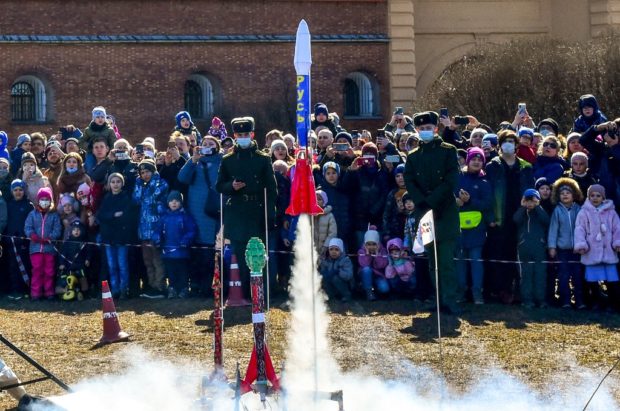Russians celebrate 60 years since Gagarin’s spaceflight

Bystanders watch the launch of model rockets near The Peter and Paul Fortress in Saint Petersburg on April 11, 2021, during a celebration of the 60th anniversary of Russia’s Yuri Gagarin’s first manned flight into space. Sixty years ago, Soviet cosmonaut Yuri Gagarin became the first person in space, marking a new chapter in the history of space exploration. Photo by Olga MALTSEVA / AFP
MOSCOW — Russians on Monday celebrate the 60th anniversary of the first manned flight to space carried out by cosmonaut Yuri Gagarin as the Soviet hero remains one of the most admired figures in the country.
Russian President Vladimir Putin is due to travel to Engels, a city in the south of the country on the banks of the Volga river, to the site of the cosmonaut’s landing where a memorial stands to honor the historic flight.
The anniversary of the spaceflight is a “day of national pride” for Russia, Putin’s spokesman Dmitry Peskov told reporters on Friday.
On April 12, 1961, Gagarin’s Vostok spacecraft took off from the Baikonur cosmodrome in Kazakhstan, then part of the Soviet Union, as the 27-year-old cosmonaut exclaimed his iconic catchphrase “Let’s go!”.
His flight lasted just 108 minutes, the time it took to complete one loop around the Earth, before returning to home soil.
Article continues after this advertisementThe legend of the man who rose from humble beginnings to become a Soviet hero lives on today and the day of Gagarin’s flight is celebrated every year in Russia as Cosmonautics Day.
Article continues after this advertisementHis now rusty Vostok capsule is on display at Moscow’s Museum of Cosmonautics where an exhibition dedicated to Gagarin is set to open on Tuesday.
Visitors will be shown documents, photos and personal belongings of Gagarin, some dating back to his childhood and school years.
“This is probably the only surname that everyone knows, from four-year-old children to people over 80,” Vyacheslav Klimentov, historian and the museum’s deputy director of research, told AFP.
“I would say that Gagarin’s feat, that saw a man go to space for the first time, bonds all Russians together,” he added.
National pride
Gagarin’s flight remains a source of national pride in Russia and a symbol of the Soviet Union’s dominance in space during that era. Four years before Gagarin, the USSR had already become the first country to send into orbit a satellite, called Sputnik.
Sixty years on, Russia continues to frequently send its cosmonauts to the International Space Station (ISS). On Friday, a Russian Soyuz spacecraft, honoring the anniversary of Gagarin’s flight, blasted off from the Baikonur cosmodrome with two Russians and a US astronaut on board.
But the anniversary also comes at a difficult time for Russia’s space industry, which has suffered a number of setbacks recently, from corruption scandals to an aborted take-off endangering a manned mission in 2018.
Russia’s aging Soyuz rockets are reliable and allow Moscow to remain relevant in the modern space industry, but the country is struggling to innovate and keep up with other key players.
In a major blow, Russia last year lost its monopoly for manned ISS launches after reusable rockets from Elon Musk’s Space X, carrying NASA astronauts, successfully docked at the space station.
Together with reduced funding, this could mean hard times for Russia’s space agency Roscosmos even though its chief Dmitry Rogozin continues to promise ambitious projects, including a mission to Venus and a station on the Moon.